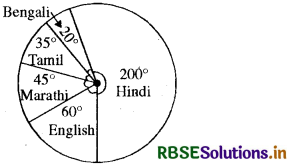RBSE Solutions for Class 8 Maths Chapter 5 Data Handling Ex 5.2
Rajasthan Board RBSE Solutions for Class 8 Maths Chapter 5 Data Handling Ex 5.2 Textbook Exercise Questions and Answers.
RBSE Class 8 Maths Solutions Chapter 5 Data Handling Ex 5.2
Question 1.
A survey was made to find the type of music that a certain group of young people liked in a city. Adjoining pie chart shows the findings of this survey.
From this pie chart answer the following:
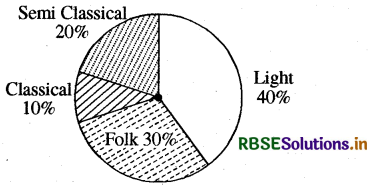
(i) If 20 people liked classical music, how many young people were surveyed?
(ii) Which type of music is liked by the maximum number of people?
(iii) If a cassette company were to make 1000 CD’s, how many of each type would they make?
Answer:
(i) Let x be the number of young people surveyed.
∴ 10% of x = 20
or \(\frac{10}{100}\) × x = 20
or x = 20 × \(\frac{100}{10}\)
or x = 20 × 10
= 200
Hence number of young people surveyed = 200
(ii) Light music
(iii) No. of semi-classical CD’s
= 20% of 1000 = \(\frac{20}{100}\) × 1000 = 200
No. of classical music CD's
= 10% of 1000 = \(\frac{10}{100}\) × 1000 = 100
No. of folk music CD’s
= \(\frac{30}{100}\) × 1000 = 300
No. of light music CD’s
= \(\frac{40}{100}\) × 1000 = 400

Question 2.
A group of 360 people were asked to vote for their favourite season from the three seasons summer, rainy, winter and summer.
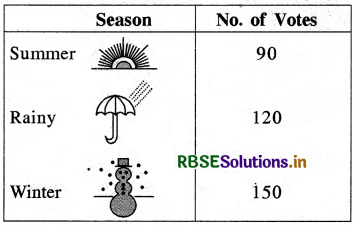
(i) Which season got the most votes?
(ii) Find the central angle of each sector.
(iii) Draw a pie chart to show this information.
Answer:
(i) Number of votes in winter season are maximum i.e. 150 votes.
(ii) Pie chart calculation:
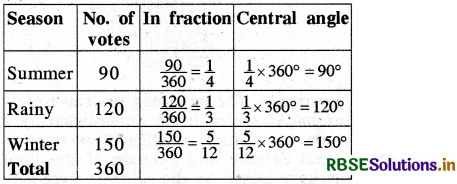
(iii) Pie chart-
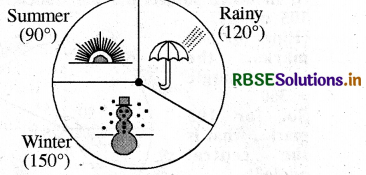

Question 3.
Draw a pie chart showing the following information. The table shows the colours preferred by a group of people.
|
Colour |
Number of people |
|
Blue |
18 |
|
Green |
9 |
|
Red |
6 |
|
Yellow |
3 |
|
Total |
36 |
Answer:
We find the central angles for each sector as below:
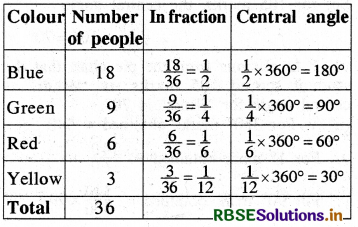
Pie chart is given below:
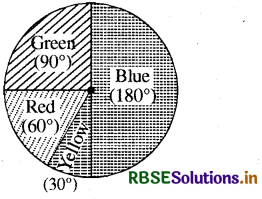

Question 4.
The adjoining pie chart gives the marks scored in an examination by a student in Hindi, English, Mathematics, Social Science and Science. If the total marks obtained by the students were 540, answer the following questions.
(i) In which subject did the student score 105 marks?
(Hint: for 540 marks, the central angle = 360°.
So, for 105 marks, what is the central angle?)
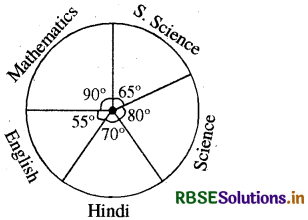
(ii) How many more marks were obtained Hindi by the student in Mathematics than in Hindi?
(iii) Examine whether the sum of the marks obtained in Social Science and Mathematics is more than that in Science and Hindi. (Hint: Just study the Central angles).
Answer:
(i) For 540 marks, the central angle = 360°
So, for 1 mark, the central angle = \(\frac{360^{\circ}}{540^{\circ}}\)
So, for 105 marks, the central angle
= \(\frac{360^{\circ}}{540^{\circ}}\) × 105 = 70°
∴ It is obvious from the pie chart that the student scored 105 marks, in ‘Hindi’ as central angle for ‘Hindi’ is 70°.
(ii) ∵ For 360° marks obtained = 540
∴ For 1° mark obtained = \(\frac{540}{360}\)
∴ For 90° mark obtained = \(\frac{540}{360}\) × 90°
∴ Marks obtained in Mathematics = 135
Marks obtained in Hindi =105
Difference in Marks = 135 - 105 = 30 marks
(iii) Marks obtained in social sciences
= \(\frac{\text { Total marks }}{\text { Total Central angle }}\) × Central angle of an item
= \(\frac{540}{360^{\circ}}\) × 65° = 97.5
Marks obtained in science = \(\frac{540}{360^{\circ}}\) × 80° = 120
Marks obtained in (SST + Math) = 97.5 + 135 = 232.5
Marks obtained in (Science + Hindi) = 120 + 105 = 225

Question 5.
The number of students in a hostel, speaking different languages is given below. Display the data in a pie chart.
|
Language |
Number of students |
|
Hindi |
40 |
|
English |
12 |
|
Marathi |
9 |
|
Tamil |
7 |
|
Bengali |
4 |
|
Total |
72 |
Answer:
First we find the central angle of each sector.
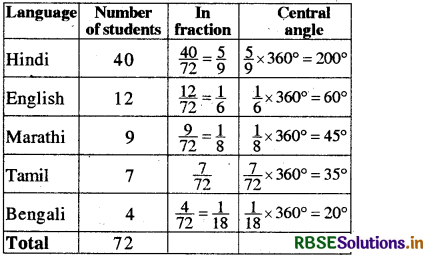
Pie chart is given below:
